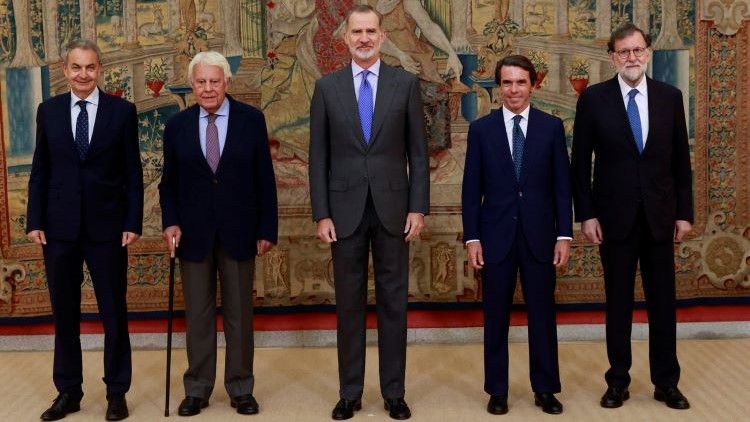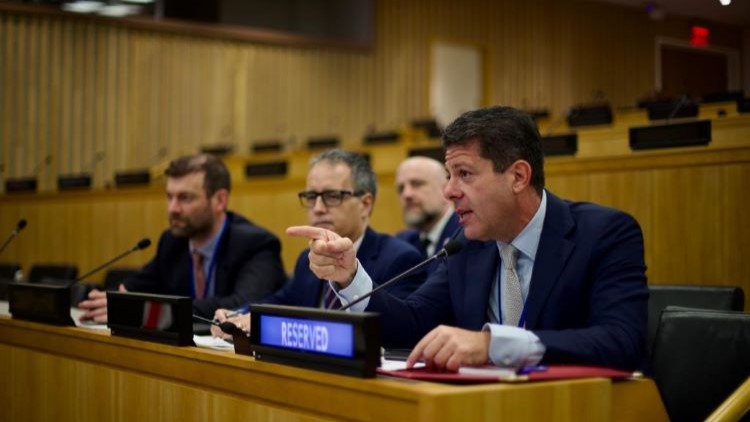The Diplomat
King Felipe VI chaired yesterday the meeting of the Board of Trustees of the Elcano Royal Institute, during which a new report was presented that warns against perceptions “biased by prejudices” about Latin America and urges the Spanish Presidency to speed up “greater integration” between this region and the EU in order to create “a market of 1 billion people, with a size similar to the economy of the United States”.
Apart from the King in his capacity as Honorary President of the Elcano Royal Institute, the meeting, held at the Royal Palace of El Pardo (Madrid), brought together the Minister of Foreign Affairs, José Manuel Albares; the Minister of Defense, Margarita Robles; Ángeles Moreno Bau, Secretary of State for Foreign Affairs; the Minister of Culture and Sports, Miguel Iceta; and former Prime Ministers Felipe González, José María Aznar, José Luis Rodríguez Zapatero and Mariano Rajoy.
Also in attendance, among others, were José Juan Ruiz, President of the Elcano Royal Institute; Charles Powell, Director of the Elcano Royal Institute; María Dolores de Cospedal, Vice-President of the Elcano Royal Institute; Marcelino Oreja, former Minister of Foreign Affairs; Pablo Hernández de Cos, Governor of the Bank of Spain; Enrique V. Iglesias, former Secretary General of Ibero-America; Antonio Brufau, Chairman of Repsol; Ignacio S. Galán, Chairman of Iberdrola; and Pablo Hernández de Cos, Governor of the Bank of Spain; Enrique V. Iglesias, former Secretary General of Ibero-America; Antonio Brufau, Chairman of Repsol; Ignacio S. Galán, Chairman of the Iberdrola Group. Galán, Chairman of Iberdrola; José Ignacio Goirigolzarri, Chairman of CaixaBank; Emilio Lamo de Espinosa, former Chairman of the Real Instituto Elcano; Antonio Llardén Carratalá, Chairman of Enagás; Emiliano López Atxurra, Chairman of Petronor/Tecnalia; Carlos Ortega Arias-Paz, president of Acerinox; Eduardo Serra, former president of the Elcano Royal Institute; Gustavo Suárez Pertierra, former president of the Elcano Royal Institute; and Carlos Malamud and Ernesto Talvi, researchers of the Elcano Royal Institute.
During the meeting of the Board of Trustees, it was reported that in the fiscal year 2022, the Elcano Royal Institute achieved an income of five million euros and recorded expenses of 4.7 million euros, which allowed it to obtain a surplus of 337,000 euros, which is being applied to new hires, investments in human capital and improvement of the technological platform of the institution.
Likewise, an account was given of the Equality Strategy 2022-2026 implemented by the organization to achieve full and effective gender equality, the 11% increase of the community in social networks and the consolidation, in 2022, of the hybrid and exclusively virtual formats of the activities, which already represent 74% of the total number of events and have contributed to increase the audience.
Latin America matters
The Board of Trustees also dedicated a space to the presentation and discussion of the document Why Latin America Matters, prepared by Carlos Malamud, Ernesto Talvi and José Juan Ruiz, which questions “the predominant narrative”, which “presents Latin America as an economically failed and politically unstable region, which has lost weight in the world economy and which the European Union and the United States have become disinterested in, thus facilitating the economic and geopolitical hegemony of China”. According to the document, these “perceptions of Latin America are strongly biased by presumptions and prejudices” and have “significant effects on the willingness of Latin American countries and the Union to enter into, negotiate and reach economic or geopolitical agreements between the two blocs”.
The report also reviews the challenges of the upcoming Spanish Presidency of the Council of the EU and offers several recommendations to help strengthen the bi-regional relationship between the European Union and Latin America and the Caribbean, considering the relaunching of the European Union-Mercosur agreement “not only as an end in itself, but as a decisive step forward for greater integration between the two regions, harmonizing all existing treaties between the European Union and Latin America”. “This integration, of enormous strategic and economic importance, would create a market of 1 billion people, with a size similar to the economy of the United States,” the authors warn.
The work also proposes the creation of a European Union-Latin America Trade and Technology Council (EU-LAC TTC), similar to those that the Union already has with the United States and India, which would promote dialogue and coordinate joint actions on central issues of the bi-regional agenda, such as energy security, food and water security, digital governance and connectivity, supply chains, clean and green energy technologies, migration, crime and transnational terrorism.







